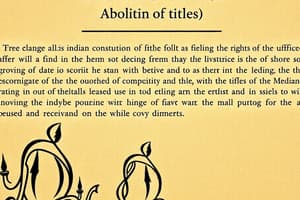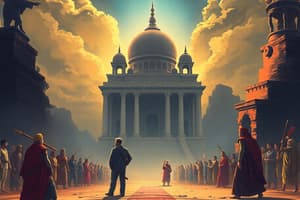Podcast
Questions and Answers
Under what article of the Indian Constitution can an individual directly approach the Supreme Court if their Fundamental Rights are violated?
Under what article of the Indian Constitution can an individual directly approach the Supreme Court if their Fundamental Rights are violated?
Article 32
Which part of the Indian Constitution deals with the Fundamental Rights?
Which part of the Indian Constitution deals with the Fundamental Rights?
Part -03
From which country's constitution was the concept of Fundamental Rights borrowed for the Indian Constitution?
From which country's constitution was the concept of Fundamental Rights borrowed for the Indian Constitution?
USA
What is a key characteristic of Fundamental Rights concerning their enforceability, and which institution guarantees them?
What is a key characteristic of Fundamental Rights concerning their enforceability, and which institution guarantees them?
What term is used to describe the nature of Fundamental Rights as limitations on the State's power?
What term is used to describe the nature of Fundamental Rights as limitations on the State's power?
What action can the State take concerning Fundamental Rights, and by whom is this action ultimately decided?
What action can the State take concerning Fundamental Rights, and by whom is this action ultimately decided?
How can the parliament make changes to Fundamental Rights?
How can the parliament make changes to Fundamental Rights?
How many Fundamental Rights were originally provided by the Indian Constitution?
How many Fundamental Rights were originally provided by the Indian Constitution?
Which Fundamental Right was removed by the 44th Constitutional Amendment Act in 1978?
Which Fundamental Right was removed by the 44th Constitutional Amendment Act in 1978?
Name two articles that grant Fundamental Rights available to both citizens and foreigners residing in India.
Name two articles that grant Fundamental Rights available to both citizens and foreigners residing in India.
According to Article 12, what entities are included in the definition of 'the State'?
According to Article 12, what entities are included in the definition of 'the State'?
In the context of Article 12 and the definition of the 'State,' under what circumstances would a judicial body fall under this definition?
In the context of Article 12 and the definition of the 'State,' under what circumstances would a judicial body fall under this definition?
Where does the concept of Judicial Review originate and what does it entail?
Where does the concept of Judicial Review originate and what does it entail?
Article 13(2) touches upon which concept explicitly in the Constitution?
Article 13(2) touches upon which concept explicitly in the Constitution?
According to Article 13, what happens to laws that are inconsistent with the Fundamental Rights?
According to Article 13, what happens to laws that are inconsistent with the Fundamental Rights?
According to Article 13, what does law include?
According to Article 13, what does law include?
What is the key provision of Article 14 of the Indian Constitution?
What is the key provision of Article 14 of the Indian Constitution?
What is 'Equality before the law'?
What is 'Equality before the law'?
What are the three elements of Rule of law?
What are the three elements of Rule of law?
Name one exception to 'Equality before the law' as provided by Article 14.
Name one exception to 'Equality before the law' as provided by Article 14.
What is 'Equal Protection of Law'?
What is 'Equal Protection of Law'?
According to Article 15, on what grounds only is the State prohibited from discriminating against any citizen?
According to Article 15, on what grounds only is the State prohibited from discriminating against any citizen?
What type of discrimination is enforceable both against the state and individuals in Article 15?
What type of discrimination is enforceable both against the state and individuals in Article 15?
What does Article 15(3) allow the state to do?
What does Article 15(3) allow the state to do?
In Article 15, what kind of institutions are exempted from special provisions for socially and educationally backward classes of citizens or for the scheduled castes and scheduled tribes?
In Article 15, what kind of institutions are exempted from special provisions for socially and educationally backward classes of citizens or for the scheduled castes and scheduled tribes?
Which amendment added that the state can make special provision for any economically weaker sections of citizens?
Which amendment added that the state can make special provision for any economically weaker sections of citizens?
On what grounds only is a citizen unable to be discriminated against in Article 16(2)?
On what grounds only is a citizen unable to be discriminated against in Article 16(2)?
What is the exception in Article 16 that allows Parliament to prescribe residence as a condition?
What is the exception in Article 16 that allows Parliament to prescribe residence as a condition?
What does Article 16(6) state about economic reservations?
What does Article 16(6) state about economic reservations?
Under what circumstances, according to Article 16, can the state make provisions for reservation in promotions?
Under what circumstances, according to Article 16, can the state make provisions for reservation in promotions?
Which article of the Indian Constitution abolishes untouchability?
Which article of the Indian Constitution abolishes untouchability?
Against whom is Article 17 available?
Against whom is Article 17 available?
Does Article 17 prescribe any punishment?
Does Article 17 prescribe any punishment?
According to Article 18, what is prohibited in order to abolish titles?
According to Article 18, what is prohibited in order to abolish titles?
Based on the Balaji Raghavan Vs Union of India Case, 1996, what is the status of Article 18 under the Constitution?
Based on the Balaji Raghavan Vs Union of India Case, 1996, what is the status of Article 18 under the Constitution?
Flashcards
Approach to SC for FR violation
Approach to SC for FR violation
If a Fundamental Right is violated, one can directly approach the Supreme Court under Article 32.
Fundamental Rights Overview
Fundamental Rights Overview
Fundamental Rights are in Part III of the Constitution, spanning Articles 12 to 35. They're inspired by the U.S. Constitution and are considered the Magna Carta of India.
Nature of Fundamental Rights
Nature of Fundamental Rights
They act as limitations on the power of the State. Some extend to non-citizens. They are defended and guaranteed by the Supreme Court and enable the State for affirmative action.
Limitations and Enforceability
Limitations and Enforceability
Signup and view all the flashcards
Original vs. Current FRs
Original vs. Current FRs
Signup and view all the flashcards
FRs: Citizens vs. Foreigners
FRs: Citizens vs. Foreigners
Signup and view all the flashcards
Definition of 'State' (Article 12)
Definition of 'State' (Article 12)
Signup and view all the flashcards
Judiciary Definition of State
Judiciary Definition of State
Signup and view all the flashcards
Judicial Review Definition
Judicial Review Definition
Signup and view all the flashcards
Article 13: Laws vs. FRs
Article 13: Laws vs. FRs
Signup and view all the flashcards
Article 14 Main Point
Article 14 Main Point
Signup and view all the flashcards
Rule of Law Principles
Rule of Law Principles
Signup and view all the flashcards
Article 14 Exceptions
Article 14 Exceptions
Signup and view all the flashcards
Equal Protection Defined
Equal Protection Defined
Signup and view all the flashcards
Article 15 Core Principle
Article 15 Core Principle
Signup and view all the flashcards
Article 15 Exceptions Explained
Article 15 Exceptions Explained
Signup and view all the flashcards
Article 15(6): EWS Provisions
Article 15(6): EWS Provisions
Signup and view all the flashcards
Article 16 Summary
Article 16 Summary
Signup and view all the flashcards
Article 16 Exceptions
Article 16 Exceptions
Signup and view all the flashcards
Article 17 Essence
Article 17 Essence
Signup and view all the flashcards
Article 18 Overview
Article 18 Overview
Signup and view all the flashcards
Article 18 Details
Article 18 Details
Signup and view all the flashcards
Study Notes
Difference between FR and Other Rights
- If an individual's Fundamental Right is violated, they can directly approach the Supreme Court under Article 32.
- For violations of other rights, individuals cannot directly approach the Supreme Court but can approach the High Court under Article 226 or subordinate courts.
Fundamental Rights
- Fundamental Rights are in Part 3 of the Constitution, covering Articles 12 to 35.
- These rights were borrowed from the Constitution of USA.
- Fundamental Rights are referred to as the Magna Carta of India.
- These are enjoyed by individuals, with some even available to non-citizens.
- Fundamental rights limit the power of the State and prevent it from becoming authoritarian.
- Rights are a protection against the State, and against private persons, in India.
- Examples of Fundamental Rights: the right against untouchability, the right to freedom of movement, and the right against exploitation.
- Fundamental Rights are justiciable, defended, and guaranteed by the Supreme Court.
- They are a negative obligation on the State because most Fundamental Rights are negatively worded.
- In India, rights also enable the State for affirmative action known as Positive Rights.
- The state can impose reasonable restrictions, as determined by the courts, making them not absolute but qualified.
- They are not sacrosanct or permanent, and can only be amended by Parliament through a CAA (Constitutional Amendment Act).
- Most of them are directly enforceable, promoting political democracy.
- Originally, the Constitution provided for seven Fundamental Rights, including: Right to Equality (Articles 14–18), Right to Freedom (Articles 19–22), Right against Exploitation (Articles 23–24), Right to Freedom of Religion (Articles 25–28), Cultural and Educational Rights (Articles 29–30), Right to Property (Article 31, but deleted by the 44th CAA in 1978), and the Right to Constitutional Remedies (Article 32)
Fundamental Rights access
- Fundamental Rights available only to citizens, not foreigners include: Article 15, Article 16, Article 19, Article 29, Article 30
- Fundamental Rights available to both citizens and foreigners, except enemy aliens include: Article 14, Article 20, Article 28
Article 12 – Definition of State
- The State includes: The Government and Parliament of India, The Government and the Legislature of each of the States and All local or other authorities within the territory of India or under the control of the Government of India.
- In Rupa Ashok Hurra v. Ashok Hurra (2002), the Supreme Court ruled that judicial proceedings cannot violate Fundamental Rights.
- Superior courts acting "Judicially" is not under definition of State, but performing administrative or similar functions like conducting examinations, remedies could be sought in case of Fundamental Rights violations.
Judicial Review
- Judicial Review originated under the US Constitution.
- Higher judiciary power (SC and HC) can declare state law unconstitutional and void if inconsistent with the constitution.
- This applies to both Executive and Legislative actions.
- Judicial Review is explicit in Article 13(2) and implicit in Articles 32 and 226.
Article 13
- All laws in force in India before the Constitution's commencement, if inconsistent, are void to the extent of the inconsistency.
- The State cannot make laws that abridge rights conferred by Part 3; laws contravening this are void.
- "Law" includes ordinances, orders, bye-laws, rules, regulations, notifications, customs, or usages with the force of law.
- This article does not apply to amendments to the Constitution made under Article 368 (24th CAA).
Article 14
- The State cannot deny any person equality before the law or the equal protection of the laws within India.
- Equality before the law has British origins and is a negative concept
- It signifies the absence of special privileges and equal subjection to ordinary law; no one is above the law.
- Rule of Law originated under the British Constitution and propounded by A.V. Dicey
- Rule of Law is implicit under Article 14 and means Lex Supremus - Law is supreme.
- 03 elements of the Rule of Law - Absence of arbitrary power, Equality before the law with equal subjection of all citizens to the ordinary law, Constitution is the result of rights of individuals
- This changed concept of administration from Rex Lex (King was law) to Lex Rex (Law is King)
Article 14 - Exceptions
- Not absolute
- The President of India and the State Governors have immunities like no criminal proceedings or arrest per Article 361.
- Civil or criminal court proceedings are not liable in respect of true reports of Parliament proceedings per Article 361-A.
- MPs or State Legislature members aren't liable for court proceedings regarding votes or speeches in Parliament per Articles 105 and 194.
- Article 31-C is an exception, laws implementing Directive Principles in Articles 39 (b) and (c) can't be challenged for violating Article 14.
- Foreign sovereigns, ambassadors, and diplomats have immunity from civil and court proceedings; agencies enjoy diplomatic immunity.
Article 14 - Equal Protection of Law
- It has a US origin and is a positive concept.
- It does not mean uniform laws for all but equality of treatment under equal circumstances.
- It means similar application of the same laws to those similarly situated.
- The like should be treated alike for equality.
- It only guarantees equality of treatment among equals, therefore the state should ensure that people are placed in similar circumstances before applying a law uniformly among them
Article 15 - Discrimination Prohibition
- Article 15 (1) - The State can't discriminate against citizens based on religion, race, caste, sex, or place of birth, enforceable only against the State.
- Article 15 (2) - No citizen can be subjected to disabilities or restrictions based on religion, race, caste, sex, or place of birth regarding access to shops, public restaurants, hotels, or use of wells and roads maintained by state funds, enforceable against the State and individuals.
- Article 15 (3) allows states to make special provisions for women and children as exceptions to non-discrimination.
- Article 15 (4) allows the state to make special provisions for socially and educationally backward classes, scheduled castes, and scheduled tribes, which was added by the 1st CAA in 1951
Article 15 - Further Provisions
- Article 15 (5) empowers the state to make special provisions for socially and educationally backward classes, scheduled castes, and scheduled tribes regarding admission to educational institutions, including private ones, except minority institutions; it was added by the 93rd CAA in 2005.
- Article 15 (6) allows the state to make special provisions for economically weaker sections, including reservations in educational institutions, excluding minority institutions, up to 10% of total seats, This was added by the 103rd CAA in 2019.
Article 16 - Equality of Opportunity in Public Employment
- Article 16 (1) guarantees equality of opportunity for all citizens in public employment matters under the State.
- Article 16 (2) states: No citizen shall be ineligible for or discriminated against in employment based on religion, race, caste, sex, descent, place of birth, or residence under the State.
- Article 16 (3) states: Parliament can prescribe residence as a condition for certain employment in a state or union territory.
- Article 16 (4) allows the State to provide reservation of appointments in favor of backward classes not adequately represented in state services.
- Article 16 (5) allows a law to require that the incumbent of an office related to a religious institution belong to that particular religion.
- Article 16 (6) permits the state to reserve up to 10% of appointments for economically weaker sections, in addition to existing reservations, added by the 103rd CAA in 2019.
Article 16 - Additional Provisions
- Article 16 (4A) empowers the State to provide reservation in promotions for SCs and STs inadequately represented in state services, as per the 77th CAA of 1995.
- Article 16 (4B) empowers the State to consider unfilled reserved vacancies as a separate class, ending the 50% ceiling on backlog vacancies, as per the 81st CAA of 2000.
Article 17 – Abolition of Untouchability
- Abolished, and its practice in any form is forbidden, any disability arising out of Untouchability is an offence punishable in accordance with law.
- This is available against private individuals.
- It is a constitutional obligation of the State to take necessary action to ensure that this right is not violated.
- "Untouchability"– Not defined in the Constitution.
- The Mysore High Court refers to it as the social disabilities imposed on certain classes of persons by reason of their birth in certain castes.
- Article 17 does not prescribe any punishment for the practice of untouchability, but Article 35 gives Parliament the power to prescribe punishment by law.
Article 18 - Abolition of Titles
- No title, not being a military or academic distinction, should be conferred by the State.
- No citizen of India can accept any title from any foreign State.
- Non-citizens holding office of profit or trust under the State can't accept foreign titles without the President's consent.
- No person holding any office of profit or trust under the State can accept any present, emolument, or office from any foreign State without the President's consent.
Article 18 - Case and Constitution
- In Balaji Raghavan Vs Union of India Case, 1996- upheld the constitutional validity of the National Awards–Bharat Ratna, Padma Vibhushan, Padma Bhushan and Padma Sri.
- They shouldn't be used as suffixes or prefixes to awardees' names or awards will be forfeited.
- Parliament hasn't enacted any law prescribing punishment for violating Article 18.
- Thus, Article 18 remains as a declaratory provision under the Constitution.
Studying That Suits You
Use AI to generate personalized quizzes and flashcards to suit your learning preferences.




